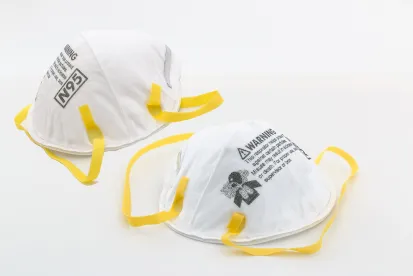On July 2, 2020, the Occupational Safety and Health Administration (“OSHA”) published a series of frequently asked questions and answers providing guidance on how OSHA’s standards apply in the context of COVID-19. Notably, while OSHA endorses guidance from the Centers for Disease Control and Prevention (“CDC”) recommending that employees wear “cloth face coverings,” OSHA’s guidance reminds employers that they must be cognizant of the limitations of cloth face coverings and the risks they may present.
Previous OSHA Guidance
Federal law requires employers to provide their employees with a workplace “free from recognized hazards likely to cause death or serious physical harm.” This general duty, which OSHA enforces, applies as much to protecting employees from COVID-19 as to any other recognized hazard employees may encounter in the workplace. While the CDC, the Equal Employment Opportunity Commission (“EEOC”), and state/localagencies have been quick to issue and update specific guidance on dealing with COVID-19 in general and in the workplace specifically, OSHA has been relatively late to the party. Much of the guidance from OSHA to date has been focused on reporting requirements and industry-specific guidance, though OSHA has released high-level guidance on preparing the workplace and on returning to work.
OSHA’s Guidance on Face Coverings
In the new FAQs, OSHA recommends that employers “encourage” employees to wear face coverings but does not require employers to provide masks or other face coverings to protect employees from COVID-19. OSHA draws a distinction between (i) “cloth face coverings,” including both manufactured and homemade products, such as bandanas, scarves, and items made from other fabric; (ii) medical grade surgical masks; and (iii) respirators meeting technical standards. In some instances, items appearing to be or sold as surgical masks or respirators may not be cleared by the relevant agency and may not meet required minimum standards.
With respect to cloth face coverings, the OSHA guidance reminds employers that, in certain circumstances, wearing such face coverings “presents or exacerbates a hazard.” Cloth face coverings are not considered personal protective equipment (“PPE”) and may not be provided by employers or used by employees in situations where applicable safety standards mandate the use of PPE meeting certain technical standards (such as respirators). For example, a worker who is exposed to particulates or dust in the course of his or her duties may not use a bandana or scarf in place of a respirator. Even where respirators are unavailable due to COVID-19-related supply/demand issues, cloth face coverings and surgical masks may not be used in place of required equipment.
The OSHA guidance also notes that cloth face coverings present the additional risks of becoming contaminated with chemicals, accumulating infectious materials, and exacerbating heat illness, among others. Moreover, cloth face coverings are not a substitute for social distancing. Cloth face coverings should be washed in accordance with CDC guidance.
Takeaways for Employers
In the rush to address and stop the spread of COVID-19, employers cannot ignore other workplace hazards or applicable safety standards. This is consistent with guidance from other agencies like the EEOC, which has reminded employers that measures intended to prevent COVID-19 cannot ignore anti-discrimination protections designed to protect employees from unlawful treatment on the basis of disability, age, ethnicity, or any other protected characteristic.
Like many of the FAQs and informal guidance published by governmental agencies over the past few months, OSHA’s guidance does not have the force of law, as its recommendations are neither mandatory nor a “get-out-of-jail-free” card for employers who adhere to them. Nonetheless, adherence to the guidance is recommended, as employees who contract COVID-19 in the workplace may rely on the FAQs to substantiate legal claims against their employers.




 />i
/>i

